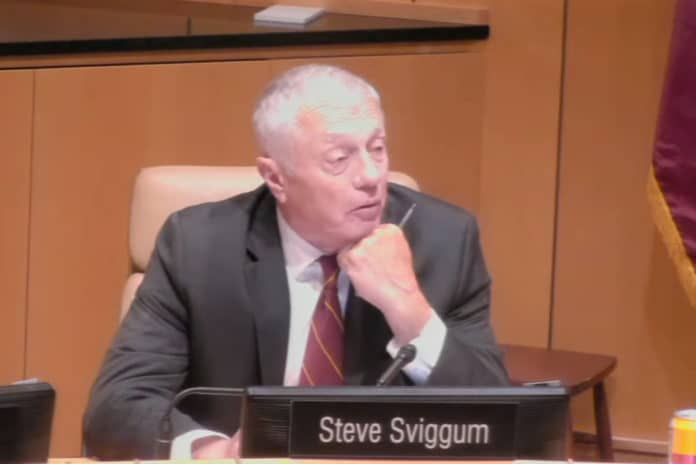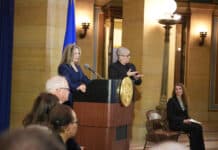
The vice chairman of the University of Minnesota Board of Regents apologized for comments he made at a meeting last week but said he has no intention of resigning.
Vice Chairman Steve Sviggum asked acting Morris Chancellor Janet Schrunk Ericksen at a Board of Regents meeting if the Morris campus had become “too diverse.”
His question prompted backlash, including calls for his resignation.
Sviggum, a 71-year-old former Minnesota House speaker, spoke to Alpha News by phone Tuesday and expressed his regret. He issued a written statement after talking to Alpha News and “unequivocally” apologized.
This clip doesn’t even need a caption. “Has UMN Morris become too diverse for a student to attend?” How is this an actual question being asked during a Board of Regents meeting??? @BSU_UMN @USGumn @mndailynews @StarTribune @Ilhan @kare11 @AlphaNewsMN @KSTP @FOX9 @RWPUSA #UMNProud pic.twitter.com/Tiz5ZCdLuS
— Watch Dog UMN (@WatchDogUMN) October 14, 2022
“I can understand why a BIPOC student at Morris would feel upset or angry [by my question]. I do recognize that. I respect that and I apologize for that,” he said. “I do apologize to the students who took it wrongly as if it was an attack on them. It was not. I applaud those students there who are bettering themselves and trying to make a better life.”
Sviggum, who served in the Minnesota Legislature for 30 years, said he has dedicated his life to public service and will not be pressured to resign. He said he’s concerned identity politics is ruining the country.
“If the far left doesn’t ruin it, identity politics will. The woke community, the liberal community, if I may be so bold as to say, has taken [my question] and jumped on it. They say it’s racist and sexist. That’s the community that says, ‘If you don’t think like me and you’re not part of the group, you don’t belong. You’re a bad guy, and we will destroy you,'” he said.
Morris is ranked in the top 50 liberal arts colleges in the country, according to Sviggum. He said enrollment at the Morris campus was an agenda item, and his intent was to understand the drop in enrollment. He said two items stuck out in the enrollment report.
“Every month we get a report from one of our five campuses regarding enrollment. There’s been an almost 50 percent reduction in enrollment at Morris. We have to find out the reasons for it,” he said. “We went from 1,700 to 1,000.”
“I think in the public sphere, every program and every policy has to stand questioning. You have to ask questions to see if the program is meeting its goals. So, there are two facts that stuck out in the report. The first fact is that the enrollment has dropped almost 50 percent and BIPOC enrollment has increased to 44.8 percent. Those are the facts. So I just asked the question, which I think in a public institution — especially one of higher education — we need to ask questions. That should be part of our role. And we should have the capability,” he said.
Sviggum insists he wasn’t suggesting diversity was the problem and rejected claims that his question was racist.
“I didn’t say, ‘This is the problem.’ I said, ‘Do we have a problem?’ I’ve heard from two families that said their children weren’t going to Morris because they didn’t feel comfortable. My question was not [race] based, was not gender based, was not [sex] based at all. It’s an honest question that I do believe needs to be part of the questions we ask for the Morris school community. We should be open to all possibilities,” he said.
“The extremes are so straightened in their position that they won’t listen to anybody else. If you challenge me or if you question me, you are a bad person. Even further, they are not willing to even consider cooperation or coming together. There’s extremes on both ends. I’m not going to say it’s just on the Democratic side because we have a few extremes on the Republican side, too. But I think it’s indicative of that polarization that exists in this country,” he continued.
He acknowledged there could be many reasons for the drop in enrollment.
“Tuition might be one. I raised also the question of how many higher education institutions do we have. Do we have too many in the state of Minnesota? We have five campuses. That might be a problem. Competition might be a problem. There are less students graduating from high school right now, too. The market is not as great,” he said.
“I apologize strongly to those students at Morris and faculty that were very hurt by the question. Morris has wonderful students who are trying to better themselves in life, become educated. Education is the great equalizer in life. And I applaud them. And I apologize to those who took it wrongly that it was an attack on their school or upon them. It was not, plain and simple. It was not,” he added.
Sviggum’s term ends next year.
Sheila Qualls
Sheila Qualls is an award-winning journalist and former civilian editor of an Army newspaper. Prior to joining Alpha News, she was a Christian Marriage and Family columnist at Patheos.com and a personal coach. Her work has been published in The Upper Room, the MOPS blog, Grown and Flown, and The Christian Post. She speaks nationally on issues involving faith and family.
















